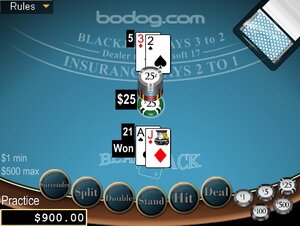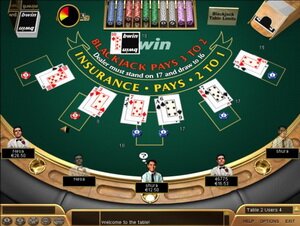How to play blackjack
The hand with the highest total wins as long as it doesn't exceed 21; a hand with a higher total than 21 is said to bust or too many. Cards 2 through 10 are worth their face value, and face cards (jack, queen, king) are all worth 10. An ace's value is 11 unless this would cause the player to bust, in which case it is worth 1. A hand in which an ace's value is counted as 11 is called a soft hand, because it cannot be busted if the player draws another card.
Each player's goal is to beat the dealer by having the higher, unbusted hand. Note that if the player busts they lose, even if the dealer also busts. If both the player and the dealer have the same point value, it is called a "push", and neither player nor dealer wins the hand. Each player has an independent game with the dealer, so it is possible for the dealer to lose to some players but still beat the other players in the same round.
The minimum/maximum bet is printed on a sign on the table and varies from casino to casino and table to table. Very rarely do casinos offer minimum bets less than the equivalent of $5 (except during promotions). After initial bets are placed, the dealer deals the cards, either from one or two hand-held decks of cards, known as a "pitch" game, or more commonly from a shoe containing four or more decks. The dealer gives two cards to each player including himself. One of the dealer's two cards is face-up so all the players can see it, and the other is face down. (The face-down card is known as the "hole card". In European blackjack, the hole card is not actually dealt until the players all play their hands.) The cards are dealt face up from a shoe, or face down if it is a pitch game.
|
Players Guide : Practice playing online blackjack for free at Alternate Casinos, with our flash game example ...here
|
 
In American blackjack, if the dealer's face-up card is an ace or a ten-value, the dealer checks their hole card to see if they have a blackjack. This check occurs before any of the players play, but after they have been offered insurance (if the face-up card is an ace). If the dealer has blackjack, all players lose their initial bets, except players who also have blackjack, who push. (In some American casinos, the dealer does not actually check the hole card until after the players have all played. At that time, if the dealer turns out to have blackjack, all players who did not have blackjack lose their bets, and players who increased their bets by doubling or splitting lose only the original bet, and have the additional bets returned to them; thus, the end result is precisely as if the dealer had checked the hole card before playing.)
A two-card hand of 21 (an ace plus a ten-value card) is called a "blackjack" or a "natural", and is an automatic winner (unless the dealer has blackjack as well, in which case the hand is a push). A player with a natural is usually paid 3:2 on his bet.

Player decisions
The player's options for playing his or her hand are :
Hit :
Take another card.
Stand :
Take no more cards, also "stick" or "stay".
Double down :
Increase the wager to a maximum of double the original bet and take exactly one more card. For example, if the player's original bet was $25, the player could increase the bet by up to an additional $25, for a new total bet of up to $50. Increasing the wager to less than twice the original bet is called "double down for less", and is not always permitted.
Split :
Double the wager and have each card be the first card in a new hand. This option is available only when both cards have the same rank or, depending on the locality, value.
Surrender :
Forfeit half the bet and give up the hand. This option is not always available.
Hand signals are required in most casinos, so that in case of a dispute, a video record exists of the player's decisions.
The player's turn is over after deciding to stand, doubling down to take a single card, or busting. If the player busts, he or she loses the bet even if the dealer goes on to bust.
After all the players have finished making their decisions, the dealer then reveals his or her hidden hole card and plays the hand. House rules say that the dealer must hit until he or she has at least 17, regardless of what the players have. In some casinos a dealer must also hit a soft 17 (a combination of cards adding up to either 7 or 17, such as an ace and a 6).
If the dealer busts then all remaining players win. Bets are normally paid out at the odds of 1:1. Players who push (tie) with the dealer receive their original bet back ...top

| Source material on BlackJack taken from Wikipedia, The Free Encyclopedia |
|
|
 Internal Links
Internal Links  Baccarat | BlackJack | Craps | Roulette | Slots | Video Poker | The Movies & Casinos | Advertise & Link Exchange | Links | | Site Map
Baccarat | BlackJack | Craps | Roulette | Slots | Video Poker | The Movies & Casinos | Advertise & Link Exchange | Links | | Site Map 888Casino | Betfair Casino | Betsson Casino | Bodog Casino | Casino 770 | Golden Palace | Intertops Casino | Royal Vegas | Sportsbook Casino
888Casino | Betfair Casino | Betsson Casino | Bodog Casino | Casino 770 | Golden Palace | Intertops Casino | Royal Vegas | Sportsbook Casino Alternate Poker Forum | Alternate Poker | Alternate Sports | The Harry Lime Zoo | Alternate Records
Alternate Poker Forum | Alternate Poker | Alternate Sports | The Harry Lime Zoo | Alternate Records





